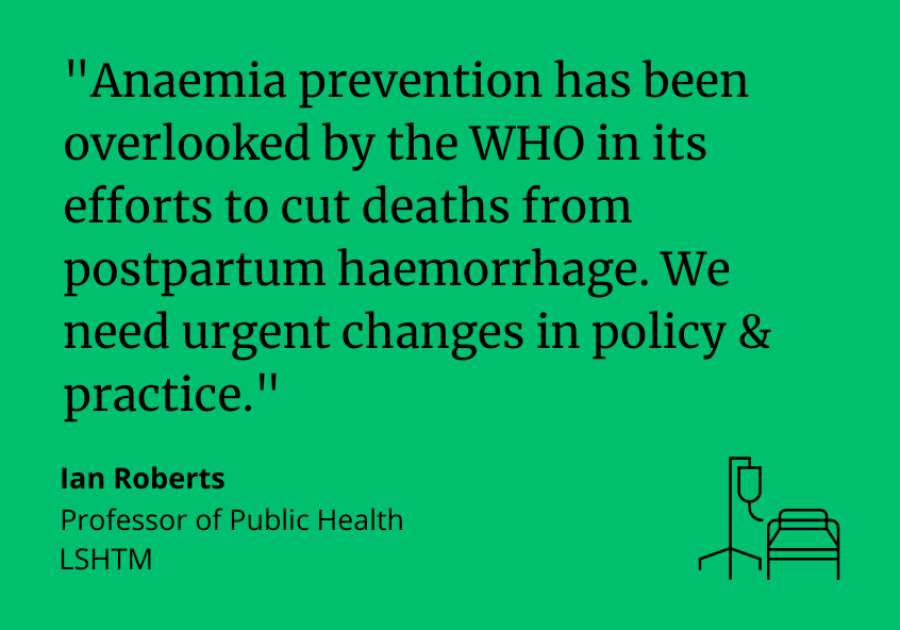Severe anaemia linked to seven-fold increased risk of death or life-threatening bleeding after childbirth
29 June 2023 London School of Hygiene & Tropical Medicine London School of Hygiene & Tropical Medicine https://lshtm.ac.uk/themes/custom/lshtm/images/lshtm-logo-black.png
Ian Roberts quote card
Pregnant women with anaemia are substantially more likely to suffer life-threatening bleeding after childbirth, according to a new study.
In a clinical study of over 10,500 women giving birth in four low-and middle-income countries, a reduction in haemoglobin, the protein in red blood cells that carries oxygen, of 10 grams per litre of blood just before birth increased the risk of life threatening bleeding after childbirth by 23%.
The findings are published in the journal The Lancet Global Health.
Women with severe anaemia (70 grams or less of haemoglobin per litre of their blood) are seven times more likely to die or to become dangerously ill than those with moderate anaemia (between 70 and 99 grams of haemoglobin per litre of blood).
Despite the strong association, anaemia was not recorded as the cause of severe bleeding in any of the women studied, with the authors stressing that efforts to prevent and treat anaemia in women of child-bearing age must be strengthened.
Iron deficiency is the most common cause of anaemia. Poor access to a healthy diet, infectious diseases (such as malaria or HIV) and untreated heavy menstrual bleeding are the main causes of iron deficiency in young women.
Severe bleeding after birth, known medically as postpartum haemorrhage (PPH), is the leading cause of maternal death, killing over 70,000 mothers each year, mostly in low-or middle-income countries.
Links between maternal anaemia and PPH have been suggested before but previous studies have been limited by small sample sizes and did not consider different severities of anaemia.
In this study, a research team, including from the London School of Hygiene & Tropical Medicine (LSHTM) analysed data from the ongoing WOMAN-2 clinical trial. 10,561 pregnant women (average age of 27 years old) who were due to give birth vaginally in hospitals in Pakistan, Nigeria, Tanzania and Zambia between 2019 and 2022 were recruited.
Haemoglobin measurements were taken after the women arrived at hospital and just before they gave birth. Doctors assessed whether the new mothers experienced PPH within 24 hours following birth, according to one of three definitions: estimated blood loss of 500 millilitres or more or bleeding sufficient to cause low blood pressure or a rapid pulse (Clinical PPH); estimated loss of 500 millilitres or more (PPH defined by the World Health Organization); calculated estimated blood loss of over 1000 millilitres based on changes in haemoglobin levels and body weight (calculated PPH).
Overall, 742 (7%) of women in the study developed clinical PPH. Those with moderate anaemia had a 6.2% chance of experiencing PPH after childbirth, with the risk increasing to 11.2% if their anaemia was more severe. According to the study, a 10 gram per litre decrease in the amount of haemoglobin in the blood resulted in a 16% to 23% increase in the likelihood of developing PPH, depending on the definition used. Women with severe anaemia were seven times more likely to die or nearly die as a result of severe bleeding than those with moderate anaemia.
The authors highlight several limitations of the study, such as potential inaccuracies in estimates of blood loss which they believe may have lessened the observed association between anaemia and PPH. As every woman in the trial had either moderate or severe anaemia before giving birth, no conclusions can be made about risks for women with milder forms of the condition.
Although such questions will need to be addressed, the authors conclude that the current findings signal the pressing need to not only treat anaemia in women of childbearing age but also prevent it if fewer mothers are to lose their lives.
Dr Ian Roberts, Professor of Public Health at LSHTM, said: “Severe bleeding after childbirth kills one woman every six minutes and anaemia greatly multiplies the risk of bleeding and death. Worldwide, half a billion young women are anaemic and 20 million are severely anaemic. Anaemia prevention has been overlooked by the World Health Organization in its efforts to cut deaths from PPH. We need urgent changes in policy and practice.”
Obstetrician Professor Rizwana Chaudhri, Head of Translational Research at Shifa Tameer-e-Millat University and lead investigator in Pakistan, said: “We have robust data to show that anaemia is an important risk factor for PPH that urgently needs to be addressed before women give birth. The ongoing WOMAN-2 Trial will build on this evidence and find out whether tranexamic acid can be used as an effective intervention for PPH prevention in anaemic women.”
Raoul Mansukhani, Research Fellow in Medical Statistics at LSHTM, said: “Our study is the first to examine the link between prebirth haemoglobin and PPH in a large sample of women from countries where anaemia is common. Our results show that the lower the haemoglobin the higher the risk of severe bleeding and death. Anaemia is common and dangerous. Preventing and treating anaemia, must be a priority to reduce maternal deaths in these countries and globally.”
Further information
The WOMAN-2 trial is funded by Wellcome and the Bill & Melinda Gates Foundation.
Read more about the WOMAN-2 trial here.
If you enjoyed this article and would like to build a career in global health, we offer a range of MSc programmes covering health and data, infectious and tropical diseases, population health, and public health and policy.
Available on campus or online, including flexible study that works around your work and home life, be part of a global community at the UK's no.1 public health university.